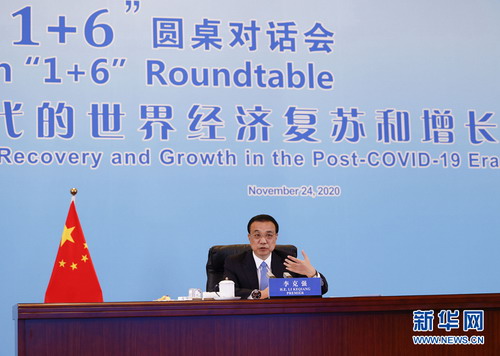
On the evening of November 24, 2020, Premier Li Keqiang held the fifth "1+6" Roundtable via videoconference at the Diaoyutai State Guesthouse with President David Malpass of the World Bank Group, Managing Director Kristalina Georgieva of the International Monetary Fund, Deputy Director-General Alan Wolff of the World Trade Organization, Director-General Guy Ryder of the International Labor Organization, Secretary-General Angel Gurria of the Organization for Economic Cooperation and Development, and Chairman Randal Quarles of the Financial Stability Board. They focused on the theme of "Promoting World Economic Recovery and Growth in the Post-COVID Era", and had in-depth discussions on the world economy, the Chinese economy and global economic governance in the post-COVID era.
Li Keqiang pointed out that facing the severe shocks of COVID-19, China has coordinated pandemic containment and economic and social development and kept employment and the economic fundamentals stable. The Chinese economy is set to achieve overall positive growth for the whole year, which is a hard-won achievement.
Li Keqiang attributed the steady recovery of the Chinese economy to the series of policies China implemented to provide relief to market entities. By supporting market entities, China will be able to sustain employment, which in turn will generate income and spur consumption necessary for bolstering economic growth. China, focused on the use of market forces, has pooled policy resources to directly target market players, in particular to help micro, small, and medium-sized enterprises and individual businesses weather the storm. With the intensified efforts to reduce taxes and fees, China has established mechanisms that go directly to cities and counties and directly benefit enterprises and the people, which have improved the timeliness of the macro policies. China has stepped up counter-cyclical adjustment of monetary policy, and innovatively introduced financial policy tools that directly reach real enterprises. China has comprehensively strengthened the policy of giving top priority to employment and focused on stabilizing and expanding employment in a market-oriented manner.
Li Keqiang also attributed the steady recovery of the Chinese economy to parallel efforts to advance reform and opening-up, which energized market entities and unleashed the internal dynamism of the economy. China has deepened reform to delegate powers, improve regulations and provide better services, and improved the business environment, bringing a flourishing situation in mass entrepreneurship and innovation. The average number of newly registered market entities daily has surpassed that of last year. In the face of the pandemic, the strong resilience displayed by the 100 million plus market entities in China and the Chinese people have provided the strongest underpinning of China's economic fundamentals and the biggest source of confidence for China in meeting difficulties and challenges ahead.
The steady recovery of the Chinese economy is also attributable to China's massive domestic market. As a large economy, China's biggest strength is its enormous domestic market. To a certain extent, the policies introduced this year are conducive to promoting consumption. In particular, employment support scheme is a strong boost to consumption. China never goes after trade surplus, but puts equal emphasis on import and export, and has been actively expanding the import of quality goods and services, with a view to better meeting the needs for industrial and consumption upgrading.
Li Keqiang pointed out that in the 14th Five-Year Plan period, China will concentrate on development and run its own affairs well. China will continue to innovate and improve macroeconomic regulation, and ensure its policies are consistent, effective and sustainable. With reform and innovation as the fundamental forces, China will accelerate the building of a world-class, market-based business environment governed by a sound legal framework. China will build a new development paradigm, expand domestic demand while opening up to the outside world, build a strong domestic market, and expedite the domestic circulation, promote higher-standard opening-up, strengthen intellectual property right protection, encourage fair competition among domestic and foreign businesses, attract more foreign investment, and encourage more Chinese companies to go global, so as to achieve more win-win outcomes.
Li Keqiang highlighted the need for the international community to meet the challenges in solidarity and cooperation. As the trend of economic globalization is irreversible, and opening-up and cooperation remain the trend of the times, all parties should uphold multilateralism and free trade and facilitate the improvement of the international economic governance system. China welcomes the conclusion and signing of the Regional Comprehensive Economic Partnership (RCEP) and will work with all parties in the spirit of partnership and join hands to build an open world economy.
Leaders of the six major international economic institutions spoke positively about China's notable achievements in fighting COVID-19. They pointed out that with its active resumption of work and production and strong economic recovery, China will be the only major economy to realize positive growth this year. China's renewed growth will help underpin global recovery and boost global confidence in defeating the virus. The 14th Five-year Plan sets out a blueprint for China's future development, which adopts a policy orientation of people first and proposes to deepen reform and open wider to the outside world to achieve greener and more sustainable economic growth. The leaders made positive comments on China's active contribution to alleviating poverty, tackling climate change, and promoting trade and investment liberalization and facilitation. All parties agreed that in the face of COVID-19 and economic challenges, all countries should step up macroeconomic policy coordination and work together for global economic recovery in the post-COVID era. All parties attach great importance to their ties and cooperation with China, and stand ready to work with China to deepen cooperation in finance, employment, poverty reduction and debt relief, jointly support multilateralism and promote development and prosperity of the world.
State Councilor and Secretary-General of the State Council Xiao Jie, and Vice Chairman of the CPPCC National Committee and head of the National Development and Reform Commission He Lifeng participated in the event.
